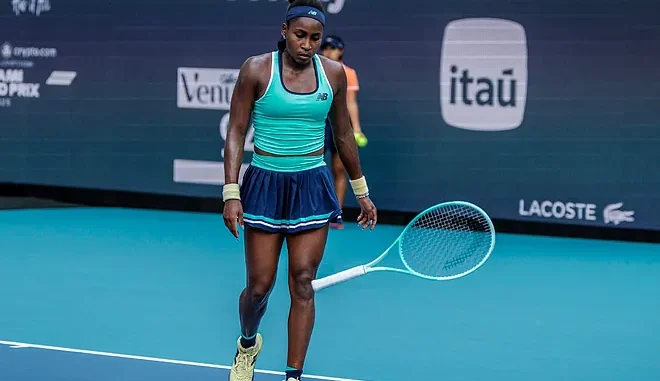
As the 2025 tennis season unfolds, Coco Gauff, one of the brightest young stars in the sport, finds herself at a crossroads. The 21-year-old American, celebrated for her meteoric rise and undeniable talent, has hit a rough patch that’s raising eyebrows among fans and experts alike. Her promising career, once marked by dazzling victories and bold predictions of greatness, is now shadowed by persistent technical flaws that refuse to fade. Among those sounding the alarm is Rennae Stubbs, a former coach of tennis legend Serena Williams, whose candid critique has sparked a fresh wave of concern about Gauff’s trajectory.
The latest chapter in Gauff’s journey unfolded at the Miami Open, where her struggles were laid bare in a disappointing loss to Magda Linette. The match, which ended 6-4, 6-4 in Linette’s favor, wasn’t just a defeat—it was a showcase of the same nagging issues that have plagued Gauff for years: a shaky serve and an unreliable forehand. Despite a strong start to the tournament, including a convincing win earlier in the week, Gauff faltered when it mattered most. She racked up 12 double faults and a slew of unforced errors, handing her opponent the upper hand in a contest she might have otherwise dominated. For fans who’ve watched her soar to Grand Slam glory—like her 2023 US Open triumph—this stumble felt like a jarring step backward.
Rennae Stubbs didn’t mince words when she weighed in on Gauff’s performance. A seasoned coach with a sharp eye for detail, Stubbs has long been vocal about the young star’s vulnerabilities, particularly under pressure. “I adore Coco Gauff, I think she’s the nicest kid. She is so personable when you see her,” Stubbs said, her tone softening momentarily before delivering the hard truth. “I hate talking about her critically because I think she’s just such a special person. But it is my job to also try and teach people why she doesn’t have the success that they think she should.” For Stubbs, the Miami Open loss was “a bit unacceptable,” especially given Gauff’s comfortable lead-in matches and the home-state support she enjoyed in Florida.
The critique zeroes in on two key weaknesses: Gauff’s serve and forehand. These technical shortcomings, Stubbs argues, are no longer just quirks of a developing player—they’re roadblocks stunting her ascent to the pinnacle of the sport. The serve, prone to double faults at critical moments, has become a liability that opponents exploit with ease. Meanwhile, her forehand, often erratic under pressure, lacks the consistency needed to compete with the WTA’s elite. Stubbs pointed out that while Gauff excels in controlled environments—like indoor tournaments where wind and weather don’t interfere—her game unravels outdoors, where variables amplify her flaws. It’s a pattern that’s become all too familiar in 2025, with early exits in the Middle East swing and a round-of-16 loss at Indian Wells echoing the same story.
Yet, Gauff’s story isn’t one of despair—at least not entirely. Her resilience and athleticism remain undeniable. She’s a fighter, blessed with speed and a competitive spirit that’s carried her to a career-high ranking and multiple titles. Just last year, a coaching shake-up with Matt Daly sparked a late-season surge, culminating in victories at the China Open and WTA Finals. That turnaround proved she’s capable of adapting and thriving. But 2025 has tested that momentum, and the Miami Open setback has reignited debates about whether she can iron out these persistent kinks before they define her legacy.
Stubbs isn’t alone in her concern, though she’s perhaps the most outspoken. Other voices in the tennis world, including fans and analysts, have noted Gauff’s struggles, with some wondering if the weight of expectation—amplified by comparisons to Serena Williams—might be part of the problem. At 21, Gauff is still young, with time to refine her game. But in a sport where prodigies mature fast and competition is relentless, the clock is ticking. Stubbs’ critique, while harsh, comes from a place of belief in Gauff’s potential. She sees a player who could dominate if only she could conquer these technical demons.
For Gauff, the road ahead is clear but daunting: address the serve, shore up the forehand, and reclaim the consistency that once had coaches like Rick Macci predicting she’d be world number one. As she prepares for the clay season, where she’ll defend semifinal points at the Italian Open and French Open, the pressure is on to turn things around. The tennis world watches eagerly, hoping this special talent can silence the doubters—Stubbs included—and write the next chapter of her already remarkable career.
Leave a Reply